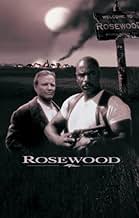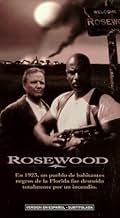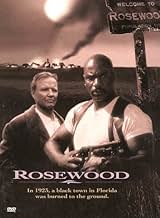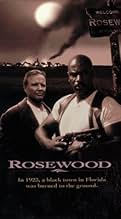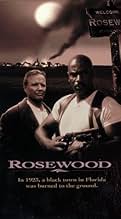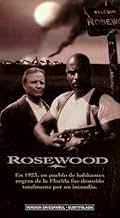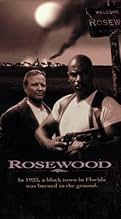CALIFICACIÓN DE IMDb
7.2/10
9.2 k
TU CALIFICACIÓN
En 1923, una mentira provocó que vigilantes blancos arrasaran un próspero pueblo negro en Florida, asesinando a sus habitantes. Algunos sobrevivieron gracias a personas extraordinarias que l... Leer todoEn 1923, una mentira provocó que vigilantes blancos arrasaran un próspero pueblo negro en Florida, asesinando a sus habitantes. Algunos sobrevivieron gracias a personas extraordinarias que los ayudaron.En 1923, una mentira provocó que vigilantes blancos arrasaran un próspero pueblo negro en Florida, asesinando a sus habitantes. Algunos sobrevivieron gracias a personas extraordinarias que los ayudaron.
- Dirección
- Guionista
- Elenco
- Premios
- 3 premios ganados y 10 nominaciones en total
- Dirección
- Guionista
- Todo el elenco y el equipo
- Producción, taquilla y más en IMDbPro
Opiniones destacadas
I saw this movie in my African American Experience class in 12th grade. It was incredibly saddening to know that such hatred exists within this country. The fact that it's a true story makes it worse. Bout time movies like this are being made despite the discomfort to others. Black history should not be denied because whites or anyone else feels uncomfortable or guilty at the end of a film. No one should be robbed of their history because it makes you "feel bad". The fear and isolation are undoubtedly felt through the black characters. To live in absolute fear for your life because of your skin color is perceptible even today. This story forces people to reconcile with the past to avoid further instances in the future. Not to make people feel guilty. Besides, minorities have felt bad in movies for a long time and nobody gave a damn as long as you know who looks good. I'm not militant or whatever else comes to mind. This movie is excellent because it shows a true story in historical fashion. Everyone did an excellent job. I felt anger and I'm sure that wasn't by accident. Jon V. was really convincing. I'm a big fan of his and he really made me dislike him. Just the very events of having a system of hatred set up against someone so that they don't get a chance is played out well in this film. Please do watch and get a little perspective.
John Singleton's Rosewood documents the tragedy of the Rosewood Massacre in piercingly raw detail, showing us how a prosperous Florida town fell to shambles from one woman's lie, spawning over a hundred murders and massive calamity on the survivor's shoulders for years to come. This event occurred in 1923, but is usually left unprinted in history textbooks and shoved to the side as if it had never occurred. Just a few weeks ago, a gunman opened fire on patrons in a movie theater, killing twelve and wounding fifty eight. That story was the most talked about thing for the entire week and still sneaks its way into the top story.
Rosewood isn't written with anger, hostility, or a burdening grudge. It is written with its mind firmly centered on history and examination rather than shameful exploitation. The town of Rosewood was populated mainly by blacks who are also operating most of it, with the notable exception of the white grocery store owner, Mr. Wright (Jon Voight). About 1/3 of the town is white, and most have a great disdain for the blacks, which as we know by now wasn't atypical.
The film centers mainly on Mann (Ving Rhames), a World War I veteran who travels aimlessly on a horse in search of land that he is willing to pay good money for. When he shows up at a town auction and becomes one of the highest bidders, he does nothing but generate sneers and racist remarks from the patrons. Mann is, for the most part, impassive towards the criticism. One of his friends that he grows closer to over time is Don Cheadle's Sylvester, who happens to be one of the strongest character actors of this or any other decade.
The hostility towards blacks skyrockets when the mentally unstable woman, Fanny Taylor (Catherine Kellner) is triggered into a screaming frenzy repeatedly saying a black man beat her, but did not rape her. The reality is, Fanny is a victim to the abuse of her lover, who consistently throws her around and leaves her bruised and battered. Regardless, there is simply no justification for this kind of impulsiveness.
And thus, the bell begins to ring louder and for longer and the towers slowly begin to fall; the town becomes even more racially divided than before, violence breaks out in the streets, houses are burned, neighbors become enemies, and secrets holding important, valuable information are kept until it's too late. A white sheriff (Michael Rooker) has an understanding of the events that occurred with Fanny Taylor, begins to piece together that the story of the evil black man beating the white woman is a myth, but is unfortunately silent about the event until violence overwhelms the once humble town. Even Mann grows aware of the impending violence and unsafe nature of this town, and fears because of his "new" status that he will fall victim to murder.
The film touches on some other topics not usually explored in a period piece, such as how the idea of racism is spread through explicit teachings from father to son. One father teaches his son how to make a noose, and continuously reminds him that the blacks are the enemies in which the whites must take action against. This even involves the father taking the son along on trips where they go hunting, and I don't mean for animals.
Writer Gregory Poirier illustrates this story on a large, limitless canvas for John Singleton to direct with a looming challenge. There is an unusually broad amount of talent here and a plethora of characters and situations to document, and Poirier is careful never to spend too much time on one specific situation, but takes the time to balance the events out evenly. It wasn't long before this that Singleton constructed Boyz N The Hood, a film detailing the tribulations of growing up on the wrong side of the street. That appears on my list of most captivating dramas for its poignant dialog and incredible performances. Rosewood is in an entirely different league; a film that features many different scenes, all highly detailed and illustrated intricately, that is strung together by an easily understandable story.
Speaking in terms of aesthetics, the costume and set design here is lavish and meticulous. From the sets of the stores, to the simplicity of the roads, the people, the clothing, and the shops, everything is portrayed in such a refreshingly different light that it becomes indescribably powerful. The care and attention here is not only commendable, but award worthy.
Yet sadly, Rosewood, like the actual event, is a long forgotten wave in the ocean of cinema and the world. The film's hefty budget, for which I assumed was mainly used on costumes, set structures, and actors, proved unable to be recouped and went on to become a commercial failure, only seen by those brave enough to endure its tragedy with an open mind and a hungering for knowledge. This is not a movie that many will be able to digest easy. It's a long and brutal picture. But one that is masterfully done in almost every respect and one that should brew a healthy, informative conversation soon afterwards.
Starring: Jon Voight, Ving Rhames, Don Cheadle, Bruce McGill, Loren Dean, Esther Rolle, Elise Neal, and Michael Rooker. Directed by: John Singleton.
Rosewood isn't written with anger, hostility, or a burdening grudge. It is written with its mind firmly centered on history and examination rather than shameful exploitation. The town of Rosewood was populated mainly by blacks who are also operating most of it, with the notable exception of the white grocery store owner, Mr. Wright (Jon Voight). About 1/3 of the town is white, and most have a great disdain for the blacks, which as we know by now wasn't atypical.
The film centers mainly on Mann (Ving Rhames), a World War I veteran who travels aimlessly on a horse in search of land that he is willing to pay good money for. When he shows up at a town auction and becomes one of the highest bidders, he does nothing but generate sneers and racist remarks from the patrons. Mann is, for the most part, impassive towards the criticism. One of his friends that he grows closer to over time is Don Cheadle's Sylvester, who happens to be one of the strongest character actors of this or any other decade.
The hostility towards blacks skyrockets when the mentally unstable woman, Fanny Taylor (Catherine Kellner) is triggered into a screaming frenzy repeatedly saying a black man beat her, but did not rape her. The reality is, Fanny is a victim to the abuse of her lover, who consistently throws her around and leaves her bruised and battered. Regardless, there is simply no justification for this kind of impulsiveness.
And thus, the bell begins to ring louder and for longer and the towers slowly begin to fall; the town becomes even more racially divided than before, violence breaks out in the streets, houses are burned, neighbors become enemies, and secrets holding important, valuable information are kept until it's too late. A white sheriff (Michael Rooker) has an understanding of the events that occurred with Fanny Taylor, begins to piece together that the story of the evil black man beating the white woman is a myth, but is unfortunately silent about the event until violence overwhelms the once humble town. Even Mann grows aware of the impending violence and unsafe nature of this town, and fears because of his "new" status that he will fall victim to murder.
The film touches on some other topics not usually explored in a period piece, such as how the idea of racism is spread through explicit teachings from father to son. One father teaches his son how to make a noose, and continuously reminds him that the blacks are the enemies in which the whites must take action against. This even involves the father taking the son along on trips where they go hunting, and I don't mean for animals.
Writer Gregory Poirier illustrates this story on a large, limitless canvas for John Singleton to direct with a looming challenge. There is an unusually broad amount of talent here and a plethora of characters and situations to document, and Poirier is careful never to spend too much time on one specific situation, but takes the time to balance the events out evenly. It wasn't long before this that Singleton constructed Boyz N The Hood, a film detailing the tribulations of growing up on the wrong side of the street. That appears on my list of most captivating dramas for its poignant dialog and incredible performances. Rosewood is in an entirely different league; a film that features many different scenes, all highly detailed and illustrated intricately, that is strung together by an easily understandable story.
Speaking in terms of aesthetics, the costume and set design here is lavish and meticulous. From the sets of the stores, to the simplicity of the roads, the people, the clothing, and the shops, everything is portrayed in such a refreshingly different light that it becomes indescribably powerful. The care and attention here is not only commendable, but award worthy.
Yet sadly, Rosewood, like the actual event, is a long forgotten wave in the ocean of cinema and the world. The film's hefty budget, for which I assumed was mainly used on costumes, set structures, and actors, proved unable to be recouped and went on to become a commercial failure, only seen by those brave enough to endure its tragedy with an open mind and a hungering for knowledge. This is not a movie that many will be able to digest easy. It's a long and brutal picture. But one that is masterfully done in almost every respect and one that should brew a healthy, informative conversation soon afterwards.
Starring: Jon Voight, Ving Rhames, Don Cheadle, Bruce McGill, Loren Dean, Esther Rolle, Elise Neal, and Michael Rooker. Directed by: John Singleton.
10tal-49
I am white and grew up in the county where this really happened. I remember as a child driving by the place where this community was. There was a small sign that was put up by the Florida DOT that said "Rosewood" but there was nothing there. I asked my mother why and she was unsure what to tell me. Then when this movie came out I realized what had happened. I began asking the elderly people I knew, but they did not want to talk about this except for my ex-husband's step dad. He remembered being a boy and the mob trying to get his father to join them. He refused to participate and was threatened for the future of his family. I am also ashamed to say that race relations have still not gotten a lot better here. In 1969 when I was in kindergarten, I remember being sent home due to race riots in the high school. I now live in California, and I know some people found the movie distressing. Unfortunately the south has a subculture of violence even to this day. The actors did an excellent job on this film. I am so glad that the filmmakers had the courage to take this story on. People tend to think of Florida as an integrated state because of Miami and Orlando, but central and northern Florida is still very racist. For example the African-Americans still call the whites by names such as "Mr. John" or "Miss Ellen". Then little town I grew up in ,Williston, still has the African-Americans living on one side of the railroad tracks and the whites on the other "better" side. There are some whites that are very decent people and some blacks that are of very poor character. I keep waiting and praying for the day when a person will "be judged not by the color of their skin but by the content of their character" in the words of the great Martin Luther King JR. PLEASE SEE THIS MOVIE!! If Americas can take the violence that is in video games and stupid horror movies they should be able to take the true portrayal of man's inhumanity to man in this most wonderful film!!
This movie is a very violent and sad movie--guaranteed to have an impact on all its viewers. Because of the serious and violent nature of the film, I would not suggest this for viewing by younger kids, though for teens it probably will be okay--provided you watch it with them and explain the context for the film.
The exact events that happened in this small town many decades ago are very vague. We know, historically, that MANY people (mostly Black-Americans) were killed by marauding gangs of whites. However, exactly WHAT sparked it and the exact events are muddled by time and the fact that there were very few living witnesses to the carnage. As a result, the ONLY reasonable way the film could be made was to create a fictionalized drama around the framework of the known events. And, as such, it is an immensely touching and effective film.
The exact events that happened in this small town many decades ago are very vague. We know, historically, that MANY people (mostly Black-Americans) were killed by marauding gangs of whites. However, exactly WHAT sparked it and the exact events are muddled by time and the fact that there were very few living witnesses to the carnage. As a result, the ONLY reasonable way the film could be made was to create a fictionalized drama around the framework of the known events. And, as such, it is an immensely touching and effective film.
Director John Singleton who's first film (Boyz 'N the Hood)left audiences in awe has once again cast an emotional spell upon his audiences. Some people have a question of how historically accurate the film itself is. With some browsing around from site to site I found that the place and time period hold true, along with with the weaponry (I was skeptical about the dual pistol action)used in the film to be weapons of the time period. Also while browsing I came across a quote from the director himself "I am concerned about absolute historical accuracy to an extent, but I am really more worried about being truthful to the essence of what happened at Rosewood... I am making a movie that people will respond to." With that in mind the general plot seemed to take course as accurately as possible, (considering the account of this event has several different death counts depending on the source)all characters used the same names as the real life people, well besides Ving Rhames' character Mann who is entirely fictional built-in to make the movie more interesting. Other than that shady character John Singleton kept to the truth and provoked a variety of emotions from his audience once again, fulfilling his goal.In the end it was a very powerful film on a tragic event.
¿Sabías que…?
- TriviaAfter Wynton Marsalis' score was rejected, he released his score as an album called "Reeltime".
- ErroresIn the title sequence, the date is Thursday, December 31, 1922; in reality, that date was a Sunday.
- Bandas sonorasSylvester's Blues
Written by Wynton Marsalis
Produced by Delfeayo Marsalis
Performed by Eric Reed
Courtesy of Impulse Records
Selecciones populares
Inicia sesión para calificar y agrega a la lista de videos para obtener recomendaciones personalizadas
- How long is Rosewood?Con tecnología de Alexa
Detalles
- Fecha de lanzamiento
- País de origen
- Sitio oficial
- Idioma
- También se conoce como
- 黑色大風暴
- Locaciones de filmación
- Productoras
- Ver más créditos de la compañía en IMDbPro
Taquilla
- Presupuesto
- USD 25,000,000 (estimado)
- Total en EE. UU. y Canadá
- USD 13,130,349
- Fin de semana de estreno en EE. UU. y Canadá
- USD 3,154,075
- 23 feb 1997
- Total a nivel mundial
- USD 13,130,349
- Tiempo de ejecución2 horas 20 minutos
- Color
- Mezcla de sonido
- Relación de aspecto
- 2.39 : 1
Contribuir a esta página
Sugiere una edición o agrega el contenido que falta

Principales brechas de datos
By what name was Rosewood (1997) officially released in India in English?
Responda

